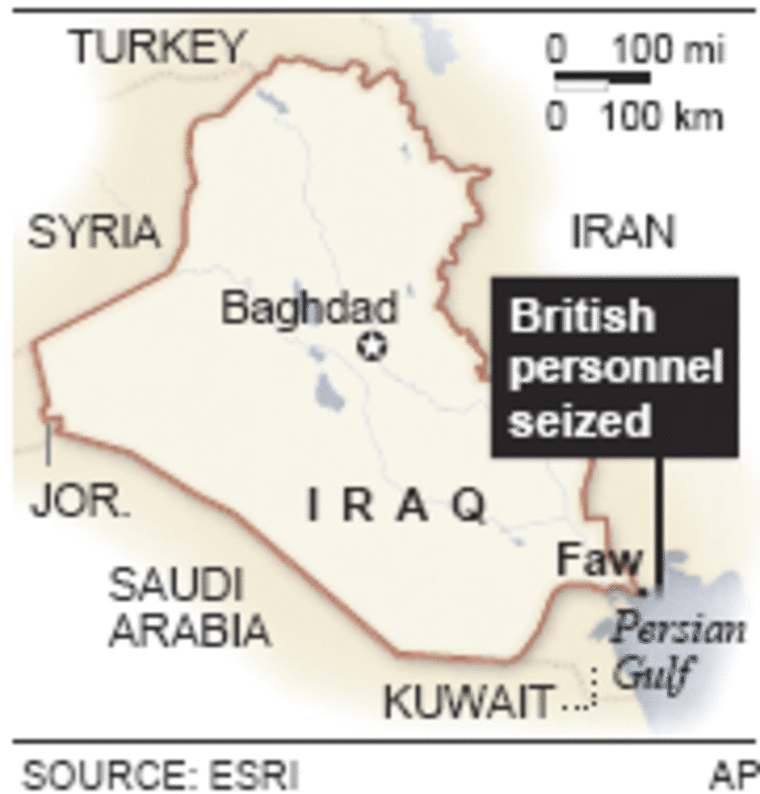British Prime Minister Tony Blair said Sunday that 15 British sailors and marines captured by Iran as they searched for smugglers off the Iraqi coast had been outside Iranian waters, and warned that Britain viewed their situation as “very serious.”
British Foreign Secretary Margaret Beckett spoke by telephone with Iranian Foreign Minister Manouchehr Mottaki late Sunday, and reiterated her country’s stance that the British sailors and marines were operating in Iraqi waters as they searched for smugglers at sea.
She asked that British diplomats be allowed to meet with the service members and demanded their safe return, the Foreign Office said. In Jerusalem, U.S. Secretary of State Condoleezza Rice also called for their release.
At a European summit in Berlin, Blair said Iran’s claim that the sailors had crossed into Iranian territorial waters “is simply not true.”
“I want to get (the situation) resolved in as easy and diplomatic a way as possible,” Blair said, but added he hoped the Iranians “understood how fundamental an issue this is for the British government.”
“This is a very serious situation,” Blair said.
Rice calls for their release
On a visit to the Middle East, Rice said the sailors and marines should be released immediately and said “we all fully trust the British” that they were not in Iranian waters when they were seized Friday.
But the Iranians also stuck by their view that the British had violated Iranian territory.
“The Iranian authorities intercepted these sailors and marines in Iranian waters and detained them in Iranian waters. This has happened in the past, as well,” Mottaki said in Persian through a translator.
“The charge against them is illegal entrance into Iranian waters,” Mottaki said. “In terms of legal issues, it’s under investigation.”
Mottaki declined to provide the exact coordinates of where the Britons were seized, saying this “very detailed information has been submitted to the representatives of the United Kingdom.”
Britain and the United States have said the sailors and marines had just completed a search of a civilian vessel in the Iraqi part of the Shatt al-Arab waterway when they were intercepted by the Iranian navy.
Troops said to be ‘well and sound’
Iranian state news agency IRNA said British Ambassador Geoffrey Adams had spoken in Tehran with Ibrahim Rahimpour, the foreign ministry official in charge of western Europe, and asked about the condition of the British sailors and marines.

He was told by Rahimpour that they were “well and sound” and that “legal proceedings” were under way in their case.
In his conversation with Beckett, Mottaki gave no firm commitment on allowing British diplomats to meet with the servicemen, a British government spokesman said.
According to IRNA’s English-language Web site, Adams said during the meeting that the British service members had been deployed in Iraq to establish security, and had no hostile intention toward Iran.
“Tehran has always exercised self-restraint in the face of border violations by the British troops,” Rahimpour was quoted as saying. But after the “contradictory statements” in the seizure of the British, the case “required an inquiry into such suspicious events.”
Territorial issue
Lord Triesman, a Foreign Office undersecretary who had held talks with Iran’s ambassador on Saturday, told Sky News there was good evidence the men were in Iraqi waters, but that the issue of whether the sailors had strayed into Iranian waters was only a technical one.
“I’ve been very clear throughout that the British forces do not ever intentionally enter into Iranian waters,” he said. “There’s no reason for them to do so, we don’t intend to do so and I think people should accept there’s good faith in those assertions.”
Iran’s top military official, Gen. Ali Reza Afshar, said on Saturday the seized Britons were taken to Tehran for questioning and had confessed to what he called an “aggression into the Islamic Republic of Iran’s waters.”
EU presses for sailors' safe return
The EU also has been pushing hard diplomatically to secure the sailors’ release. Germany, which holds the EU’s rotating presidency, had its ambassador in Tehran raise the issue with the Iranian government.
Rajanews.com, a Persian Web site run by supporters of Iranian President Mahmoud Ahmadinejad, quoted a senior diplomat as saying the Britons would not be released until they promised “not do similar things in future.”
Their capture and detention risks escalating an already fraught relationship between Iran and the West.
The U.N. Security Council on Saturday agreed to moderately tougher sanctions against Iran for its refusal to meet U.N. demands that it halt uranium enrichment. Many in the West fear the country’s nuclear program is not for power generation but for arms making, a claim Iran denies.
The approved sanctions included ban on Iranian arms exports and freezing the assets of 28 additional people and organizations involved in Iran’s nuclear and missile programs. About a third of those are linked to the Revolutionary Guard, an elite corps whose navy had seized the British sailors and marines.
British, Israeli and Saudi media reports on Sunday suggested that Iran was hoping to trade the captured Britons for Iranian officials it claims have been abducted by the West in recent months.
Ali Askari, former head of an elite unit of the Revolutionary Guard, disappeared in Turkey six weeks ago; several months earlier, six Iranian officials were taken by U.S. forces at an Iranian liaison office in Irbil, the capital of the Kurdish self-ruled region of Iraq. One was later released.
Iran said it was a government liaison office. The U.S. military said those detained were connected to an Iranian Revolutionary Guard faction that funds and arms insurgents in Iraq.
Sobh-e-Sadegh, the official publication of the Revolutionary Guards, said in a January article that it would be easy to kidnap Americans and transfer them to “any location of choice” in retaliation for any attack.
But Ahmad Bakhshaysh, a political analyst and professor in politics in Tehran’s Allameh University, said a prisoner swap was not what Iran wanted.
“Iran is not after retaliation regarding abduction of its diplomats. ... However, Iran will use this opportunity to show to the world public opinion that Britons were (the) invader and Iran was victim of the Westerners’ bullying policy,” he said.
U.S. News and World Report, citing a U.S. Army report out of Iraq, said the capture of the British sailors and marines was not the first time Iranians have taken Western forces by surprise in the border area.
The magazine said American troops working with Iraqi border guards within Iraq were attacked by a much larger Iranian military unit in September. U.S. News said no Americans were hurt in the incident, but four Iraqi soldiers, an interpreter, and an Iraqi border policeman remain missing.
